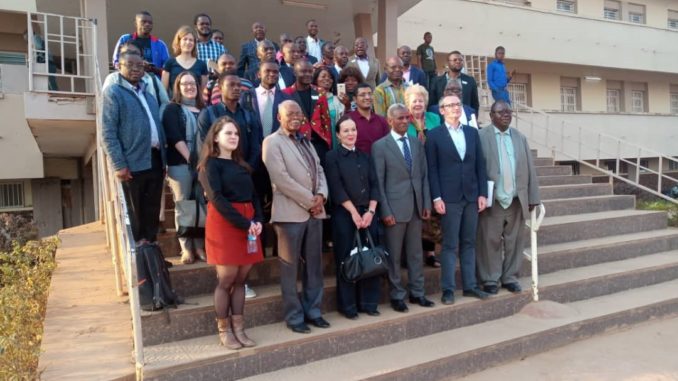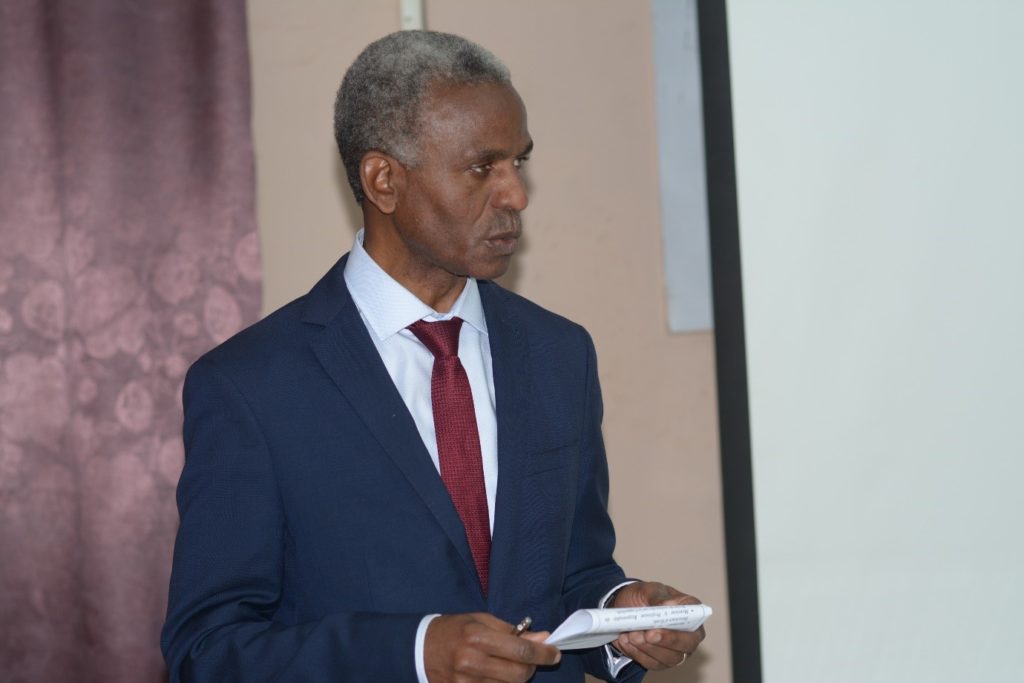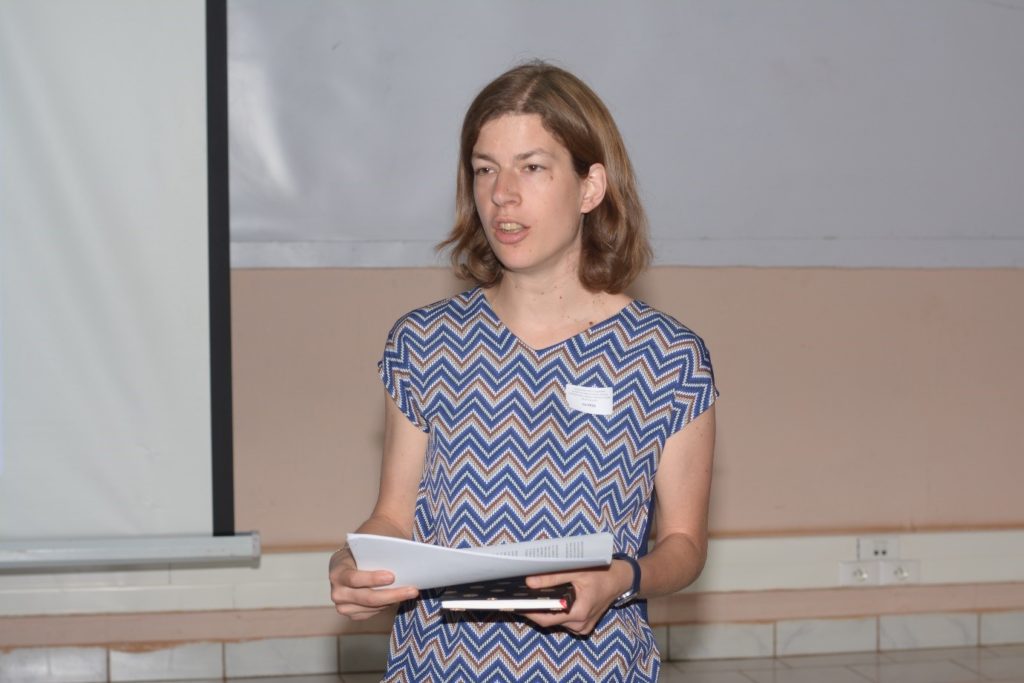
On 23-24 July 2019, the Comparing the Copperbelt project co-organised a major conference with our partners at University of Lubumbashi (UNILU). The conference, held at UNILU and entitled ‘Comparaison de le ‘copperbelt’: société, écologie et culture dans les communautés minières d’Afrique centrale’, brought together researchers from the Copperbelt project, international scholars, and more than a dozen of UNILU’s historians and social scientists, who presented their findings on historical and social change in the region. This collaboration with the University of Oxford was welcomed by the UNILU Rector Professeur Gilbert Kishiba Fitula, who has generously supported our cooperation over recent years and who formally opened the conference.

UNILU possesses an extraordinary wealth of research experience and expertise: for many decades, it has specialised in research on the changing nature of urban society in the Katangese capital Lubumbashi and the surrounding mine towns, particularly Likasi and Kolwezi. In the 1950s this field of study was dominated by Belgian social scientists, particularly those from the Centre d’Études des Problèmes Sociaux Indigènes, who worried about the capacity of newly urbanised Africans to adapt to the realities of ‘modern’ life and who sought to assist in their socialisation in ways that are now recognised as deeply paternalistic. In independent Congo/Zaire, researchers addressed equally pressing questions concerning the integration of Katanga into the independent nation-state, and the distribution of wealth generated by the region’s mining industry to its populace. In recent decades, the UNILU research project, the Observatoire du Changement Urbaine, has explored the lives of Lubumbashi’s residents as they have experienced economic decline, the impact of armed conflict and the privatisation of a mining industry that previously provided not only secure jobs but also housing and social welfare services to its employees and their families. The Observatoire, led by director Prof Donatien Dibwe dia Mwembu, has produced a wealth of material of immense value to researchers seeking to understand the realities of African urban life in the late twentieth and early twenty-first centuries. The Comparing the Copperbelt project has benefitted enormously, not only from this extraordinary body of work, but also the generosity and willingness of UNILU researchers to support our research, intellectually and practically.
As in the past, the focus of UNILU research has adapted to meet contemporary concerns, something which was reflected in conference presentations by the university’s researchers. For example, Tshitamba Kabala and Ken Anastase Mwembu Dibwe both reflected on recent and more historical elections in Katanga and the DR Congo, while Jean-Pierre Kalembe Longwa analysed the role of trade unionism in Lubumbashi’s mining industry. Arthur Kaniki explored the impact of artisanal mining on the environment and on the health and security of mineworkers, while Salvuis Bakari Amuri and his colleagues demonstrated the long-term impact of mining on the Katangese urban environment and the health of its residents. A similarly long-term analysis was provided by Yannik Useni Sikuzani et al of spatial change in Lubumbashi, while Michaël Kasombo Tshibanda provided a fascinating analysis of how the Katangese dialect of Kiswahili has been influenced by the urban context in which it has developed.
While this ongoing body of research has immense analytical and empirical strengths, it is undeniable that many Lubumbashi-based researchers are limited by their restricted opportunities to travel and therefore restricted in the extent to which they can achieve a fully comparative analysis – for example, to consider the ways in which the issues that affect society in Haut Katanga and the DR Congo are similar to or distinct from those in other urban and/or mining areas on the continent or elsewhere. Such comparative analysis has the potential to challenge a tendency in the popular imagination and in some academic circles (though not at UNILU) towards ‘Congolese exceptionalism’: the unhelpful notion that the DRC’s historical legacy and contemporary situation is uniquely appalling and therefore immune from conventional analytical approaches.

It is evident, from both our existing collaboration and in particular at this conference, that the comparative approach of the Copperbelts project has been well received. Papers drew instructive comparisons between the experience of the neighbouring mining towns of Haut Katanga and the Zambian copperbelt, and the countries as a whole. Prof Donatien Dibwe dia Mwembu provided characteristically insightful comparative analysis of relations between Haut Katanga and the Zambian Copperbelt during the colonial era. Susan Williams, who could not be physically present at the event, showed how the economically and politically strategic Copperbelt border region was subject to international espionage by mine companies and western intelligence agencies, activities that led to the murder of the first Congolese Prime Minister Patrice Lumumba and – evidence increasingly suggests – the UN Secretary General Dag Hammarskjöld. Duncan Money showed that white mineworkers played a similar role in the early period of industrial mining in the early twentieth century, but also how this diverged as a result of contrasting company policies and political contexts, shaping the politics of decolonisation in striking ways. Iva Peša and Benoît Henriet used the Comparing the Copperbelt project’s new life history research to challenge conventional understanding of how town residents experienced and related to the mine companies that ostensibly dominated their lives. Enid Guene meanwhile analysed the role of magazines and comic books in the cultural life of Zambia and Haut Katanga, while Prof Germain Ngoie Tshibambe explored the role of Congolese preachers and the circulation of spiritual knowledge in the Copperbelt region. Margaret O’Callaghan’s presentation on the so-called ‘new Copperbelt’ in Zambia’s North-West Province resonated with Congolese scholars who identified parallel problems in ensuring that local communities benefit from contemporary investments in copper and cobalt mining.
Because our project focuses on the history of knowledge production, we are acutely aware of how the legacy of colonial and post-colonial inequalities in the global academy continue to shape – and often limit – effective academic cooperation. Clearly the inequalities of access to resources and influence between universities such as Oxford and their counterparts in central Africa will not be overcome by single events or even partnerships as rich and rewarding as ours has been with UNILU. Nonetheless, it is to be hoped that the conversations and exchanges begun in Lubumbashi will facilitate ongoing research cooperation that enables increased understanding of both local specificity and comparable experiences, across the Copperbelt and beyond. Certainly, for those participants visiting Lubumbashi for the first time, the conference provided a wonderful opportunity to learn from the extraordinary expertise and experience of Congolese colleagues.
